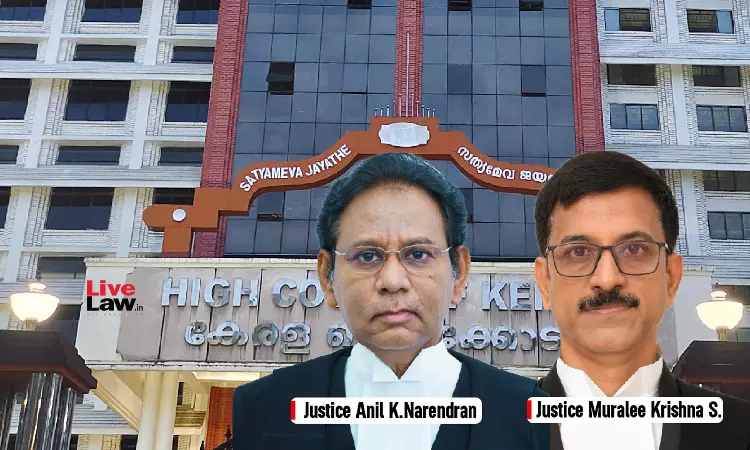- Home
- /
- High Courts
- /
- Kerala High Court
- /
- Supervisory Jurisdiction Of HC...
Supervisory Jurisdiction Of HC Doesn't Extend To Correcting All Errors In Order Of Administrative Tribunal: Kerala High Court
Anamika MJ
24 Sept 2025 12:30 PM IST
The Kerala High Court refused to interfere with State Administrative Tribunal's order which upheld the transfer of a teacher, reiterating that supervisory jurisdiction under Article 227 of the Constitution cannot be exercised to correct all errors in the order of the Administrative Tribunal. Referring to various decisions, a division bench of Justice Anil K Narendran and Justice Muralee...
The Kerala High Court refused to interfere with State Administrative Tribunal's order which upheld the transfer of a teacher, reiterating that supervisory jurisdiction under Article 227 of the Constitution cannot be exercised to correct all errors in the order of the Administrative Tribunal.
Referring to various decisions, a division bench of Justice Anil K Narendran and Justice Muralee Krishna S, in its judgment observed that powers under Article 227 can be exercised only when there is flagrant abuse of law, or if there is a manifest error, or gross failure of justice.
"...the High Court in exercise of its supervisory jurisdiction under Article 227 of the Constitution of India cannot sit in appeal over the findings recorded by the Administrative Tribunal. The supervisory jurisdiction cannot be exercised to correct all errors in the order of the Administrative Tribunal, acting within the limits of its jurisdiction. The correctional jurisdiction under Article 227 can be exercised only in a case where the order of the Administrative Tribunal has been passed in grave dereliction of duty or in flagrant abuse of fundamental principles of law or justice".
The bench further said that no interference under Article 227 is called for, unless the High Court finds that the Administrative Tribunal has committed a manifest error, or the reasoning is palpably perverse or patently unreasonable, or the decision of the Tribunal is in direct conflict with settled principles of law or where there has been gross and manifest failure of justice or the basic principles of natural justice have been flouted.
The matter arose when the petitioner, a High School Teacher (English), contested her transfer from Government Boys Higher Secondary School, Adoor, to Government High School, Thengamam. She approached the Kerala Administrative Tribunal (KAT) under Section 19 of the Administrative Tribunals Act, 1985, seeking to quash the Deputy Director of Education's order on the ground that it violated provisions of the Kerala Education Rules and earlier binding judgments of the Kerala High Court.
The Tribunal, however, declined interim relief, noting that the Adoor school had lost the sanctioned post of English teacher in the staff fixation order, and the transfer to Thengamam was to a permanent vacancy of HST(English), on account of promotion of another teacher. The petitioner challenged this order of the KAT and approached the Kerala High Court to invoke the High Court's supervisory jurisdiction under Article 227.
Citing a series of Supreme Court precedents the Bench reiterated that Article 227 is a supervisory jurisdiction.
The Court further held that the Tribunal had provided valid reasons for refusing interim relief, since the petitioner's post at Adoor had ceased to exist and she was posted to a substantive vacancy elsewhere. The reasoning was neither perverse nor illegal, and therefore did not warrant interference.
Citing Sadhiq M M v State of Kerala [2025 (1) KHC 402] where it was held that the Central Administrative Tribunal, Ernakulam Bench and the Kerala Administrative Tribunal will act like courts of first instance in respect of the areas of law for which they have been constituted, the Court added that it will not be open for litigants to directly approach the high Court even in cases where they question the virus of statutory legislation by overlooking the jurisdiction of the Tribunal Court.
“However, the Central Administrative Tribunal, Ernakulam Bench or the Kerala Administrative Tribunal shall not entertain any question regarding the virus of their parent statute, i.e., the Administrative Tribunals Act, 1985, since the said Tribunals, which are creatures of the said statute, cannot declare the very act to be unconstitutional. In such cases alone, the litigants can approach the High Court directly.” the court added.
The Court thus dismissed the plea.
Case Title: Shiny S Raj v State of Kerala
Case No: O.P(KAT) 311/ 2025
Citation: 2025 LiveLaw (Ker) 596
Counsel for Petitioner: K R Krishnakumari, Shreepriya C J
Counsel for Respondents: A J Varghese (Sr. GP)
Click Here To Read/ Download Judgment



